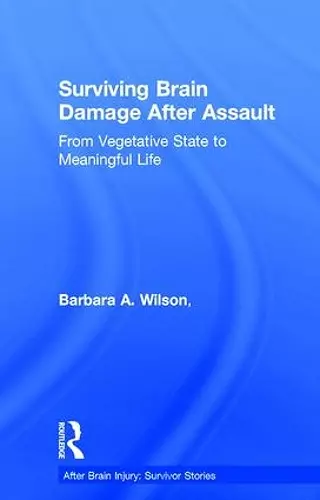Surviving Brain Damage After Assault
From Vegetative State to Meaningful Life
Barbara A Wilson author Anita Rose author Samira Kashinath Dhamapurkar author
Format:Hardback
Publisher:Taylor & Francis Ltd
Published:10th Feb '16
Currently unavailable, and unfortunately no date known when it will be back
This hardback is available in another edition too:
- Paperback£26.99(9781138824584)

At the age of twenty eight Gary was assaulted by a gang with baseball bats and a hammer, resulting in several skull fractures and severe brain damage. For nineteen months he had little awareness of his surroundings before he started to show some recovery. This inspirational book documents his exceptional journey.
The book presents a series of interviews with Gary, his mother Wendie, who never gave up, the medical team who initially treated him, and the therapists who worked with him over a period of three years. Through their testimony we learn about the devastating effects which can follow a serious assault to the head, and the long process of recovery over several years. With specialist rehabilitation and continuing family support Gary has exceeded expectations and, apart from some minor physical problems, he is now a normal young man.
Surviving Brain Damage after Assault shows that, contrary to popular belief, considerable gains can be made by people who have experienced a long period of reduced consciousness. The book will be of great value to all professionals working in rehabilitation - psychologists, speech and language therapists, occupational therapists, social workers and rehabilitation doctors, and to people who have sustained a brain injury and their families.
This is a most valuable and detailed account of delayed, gradual and continuing recovery after a very severe traumatic brain injury. The authors' thoughtful and detailed discussion of the reasons for such unexpected and prolonged improvement will be crucially important in the planning of rehabilitation research and in developing health service provision. - Lindsay McLellan, Formerly Europe Professor of Rehabilitation, University of Southampton, UK and Medical Adviser to the Brain Injury Group
Wilson, Dhamapurkar and Rose present a fascinating, thought provoking yet scientific account of late recovery from the Minimally Conscious State. This challenges the concept of ‘cut-off’ after which recovery is unlikely. Family and client perspectives enhance the account. This informative book will be of interest to all working with people with long term Disorders of Consciousness. - Agnes Shiel, Professor of Occupational Therapy, National University of Ireland, Galway, Ireland
Wilson, Dhamapurkar and Rose present a fascinating, thought provoking yet scientific account of late recovery from the Minimally Conscious State. This challenges the concept of ‘cut-off’ after which recovery is unlikely. Family and client perspectives enhance the account. This informative book will be of interest to all working with people with long term Disorders of Consciousness. - Agnes Shiel, Professor of Occupational Therapy, National University of Ireland, Galway, Ireland
This is a most valuable and detailed account of delayed, gradual and continuing recovery after a very severe traumatic brain injury. The subject is a young man who has received excellent medical and surgical care and exemplary rehabilitation input from his family and the rehabilitation team involved over several years. The authors' thoughtful and detailed discussion of the reasons for such unexpected and prolonged improvement raise many questions.
This case is a further example of the fact that people's brains are potentially able to acquire new patterns of activity and responsiveness when they undergo intensive training and acquire new skills - not only in those who are healthy, but also (to a proportional degree) after severe damage to the brain has occurred. The time course of these changes in such patients after brain injury mirrors that of active skill acquisition in normal adults, rather than passive 'spontaneous' recovery from injury. It is crucially important that this principle is recognised, both in the planning of rehabilitation research and in health service provision, if the mechanisms involved are to be fully understood and optimal recovery from brain injury is to be achieved for all. –Lindsay McLellan, Formerly Europe Professor of Rehabilitation, University of Southampton, UK and Medical Adviser to the Brain Injury Group
ISBN: 9781138824577
Dimensions: unknown
Weight: 317g
154 pages